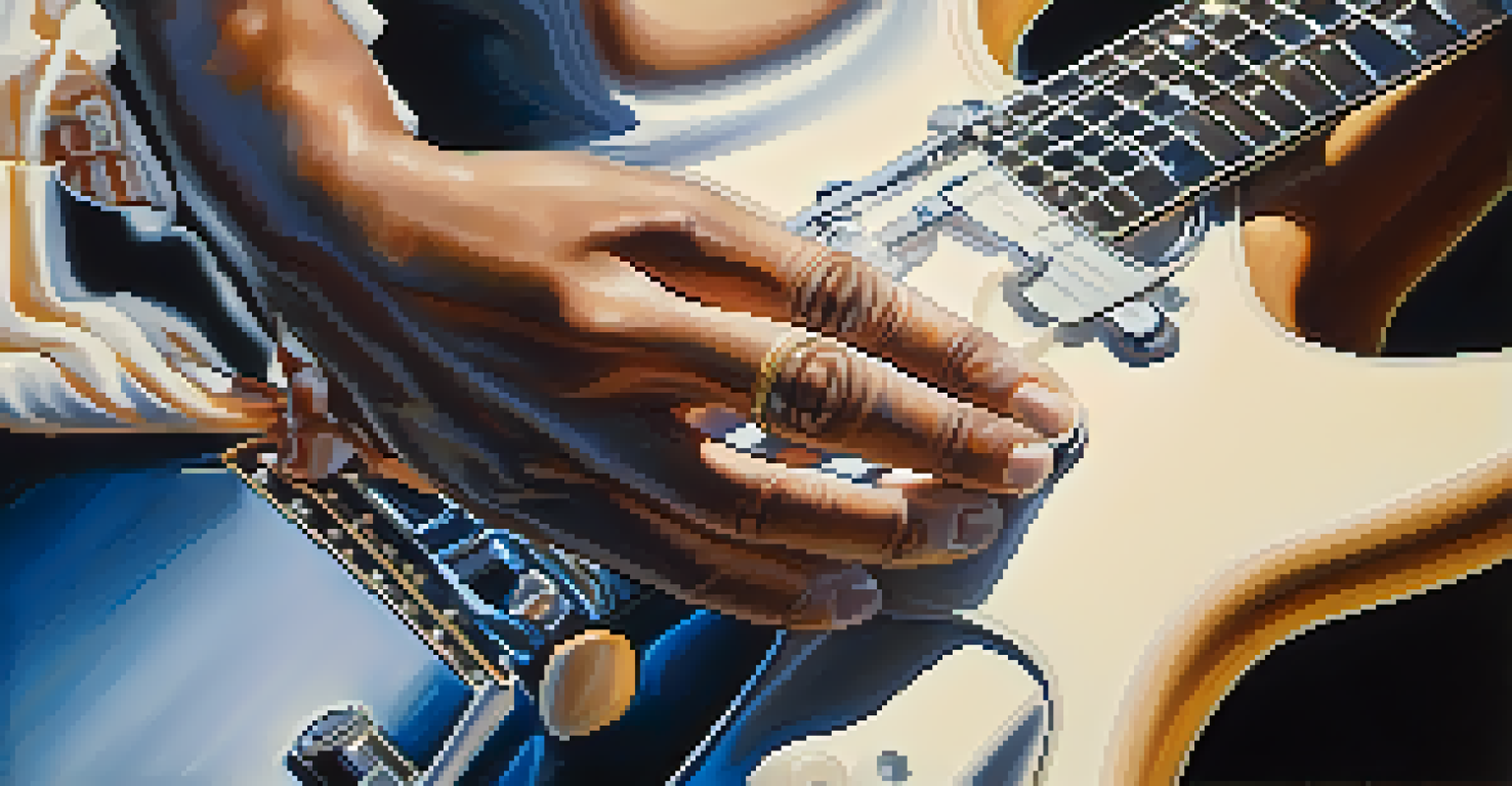Understanding Guitar Performance Anxiety: Causes and Effects

What is Guitar Performance Anxiety?
Guitar performance anxiety refers to the nervousness and fear that musicians experience before or during a performance. This can manifest as sweating, trembling, or a racing heart, making it difficult to focus on playing. For many guitarists, this anxiety can be so overwhelming that it affects their ability to enjoy or even complete a performance.
The greatest mistake you can make in life is to be continually fearing you will make one.
It's important to understand that performance anxiety is a common experience among musicians, not just guitarists. Feelings of self-doubt and fear of judgment can lead to a cycle of anxiety that may discourage individuals from pursuing their passion. Acknowledging these feelings is the first step toward managing them effectively.
Many guitarists may not realize that performance anxiety can be addressed through various strategies and techniques. By recognizing the signs and understanding its roots, musicians can learn to cope with their fears, allowing them to perform more confidently and enjoyably.
Common Causes of Guitar Performance Anxiety
Several factors can contribute to guitar performance anxiety, including fear of judgment and perfectionism. For example, a guitarist might worry excessively about making mistakes in front of an audience, leading to increased tension and anxiety. This fear can stem from previous negative experiences or simply from high personal expectations.

Another common cause is the pressure to perform well, especially during important events like competitions or auditions. The desire to impress others or secure a particular outcome can heighten anxiety levels, making it difficult to concentrate on the music. Many musicians find themselves caught in a cycle of overthinking, which only exacerbates their anxiety.
Understanding Performance Anxiety
Guitar performance anxiety is a common issue that can hinder musicians' enjoyment and ability to perform.
Additionally, the environment in which one performs can also influence anxiety levels. Performing in unfamiliar or high-stakes settings, such as a large venue or in front of an audience filled with industry professionals, can amplify feelings of nervousness. Recognizing these triggers is essential for developing effective coping strategies.
The Effects of Performance Anxiety on Guitarists
Performance anxiety can have a range of effects on guitarists, both physically and psychologically. For example, some musicians may experience physical symptoms such as muscle tension, shallow breathing, or even nausea. These symptoms can make it challenging to play confidently and may lead to a poorer performance overall.
Anxiety is the dizziness of freedom.
Psychologically, performance anxiety can diminish a guitarist's self-esteem and enjoyment of music. When anxiety takes over, it can create a negative feedback loop where the fear of failure overshadows the joy of playing. This can lead to avoidance of performing altogether, which ultimately hinders a musician's growth and development.
Moreover, the long-term effects of performance anxiety can create a barrier to success. Guitarists may miss out on opportunities to connect with audiences and showcase their talents, limiting their exposure and potential career advancements. Understanding these effects is crucial for musicians who want to break free from the constraints of anxiety.
Recognizing the Signs of Performance Anxiety
Recognizing the signs of performance anxiety is the first step toward addressing it. Common indicators include a racing heart, sweaty palms, or a feeling of impending doom before a performance. By learning to identify these physical and emotional signals, guitarists can become more aware of their anxiety levels and take proactive steps to manage them.
It's also essential to pay attention to the mental chatter that often accompanies performance anxiety. Thoughts like 'What if I mess up?' or 'Everyone will judge me' can create a cycle of negative thinking. By acknowledging these thoughts, musicians can challenge them and work toward reframing their mindset.
Coping Strategies for Anxiety
Techniques like deep breathing and visualization can help guitarists manage their performance anxiety effectively.
Keeping a journal or discussing feelings with a trusted friend or mentor can help guitarists track their anxiety over time. This self-reflection can lead to greater insights into triggers and coping strategies, ultimately empowering musicians to take control of their performance experiences.
Coping Strategies for Performance Anxiety
There are several effective coping strategies that guitarists can employ to manage performance anxiety. One popular technique is deep breathing exercises, which help calm the nervous system and reduce physical symptoms of anxiety. Simple practices, like inhaling deeply for a count of four, holding for a moment, and exhaling slowly, can make a significant difference.
Visualization is another powerful tool that musicians can use. By imagining themselves successfully performing in front of an audience, guitarists can create a positive mental image that boosts confidence. This technique can be combined with practice sessions, where musicians visualize success while playing their pieces.
Finally, regular practice in low-pressure environments can help build confidence and reduce anxiety. Performing for friends or family, or even recording oneself, can provide valuable experience without the pressure of a 'formal' performance. Over time, these small steps can lead to greater comfort and ease on stage.
The Role of Preparation in Reducing Anxiety
Preparation plays a critical role in minimizing performance anxiety for guitarists. The more familiar one is with their material, the more confident they will feel on stage. Practicing regularly and ensuring that one is well-prepared can significantly reduce feelings of nervousness before a performance.
Additionally, setting realistic goals for practice sessions can help create a sense of accomplishment. Instead of aiming for perfection, focusing on mastering specific sections or techniques can lead to gradual improvement and increased confidence. This shift in mindset can alleviate some of the pressure associated with performing.
Importance of Preparation
Thorough preparation and setting realistic goals can significantly reduce feelings of nervousness before performing.
Moreover, preparing for different scenarios, such as dealing with unexpected mistakes during a performance, can also help reduce anxiety. By having a plan in place, guitarists can approach performances with a more relaxed attitude, knowing they are equipped to handle any challenges that may arise.
Seeking Support from Others
Seeking support from fellow musicians, friends, or mentors can be a game-changer for guitarists struggling with performance anxiety. Sharing experiences and discussing feelings can provide validation and reassurance, helping musicians realize they are not alone in their struggles. This sense of community can be incredibly comforting.
Joining a music group or taking lessons can also create a supportive environment for guitarists. Engaging with others who share similar experiences can foster camaraderie and encourage musicians to step out of their comfort zones together. This collective support can make a significant difference in overcoming performance-related fears.

Finally, professional help from a therapist or counselor trained in performance anxiety can offer additional strategies and coping mechanisms. These experts can provide personalized guidance tailored to individual needs, helping guitarists develop a healthier relationship with performance.